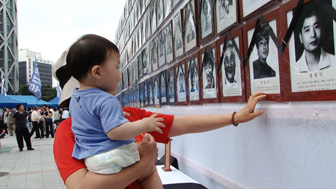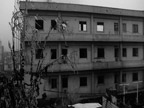Yongsan
 KOREA / 2010 / Korean / Color / Blu-ray (HD) / 73 min
KOREA / 2010 / Korean / Color / Blu-ray (HD) / 73 min
Director: Mun Jeong-hyun
Assistant Director: Ryu Han-joo
Photography: Ryu Han-joo, Mun Jeong-hyun
Editing: Yun Joon-ho, Mun Jeong-hyun
Sound: Pyo Yong-soo, Go Eun-ha
Music: Yoon Sung-hye
Production Company: P.U.R.N Production
World Sales: Cinema DAL (Lee Sang-yeop)
www.cinemadal.com
In January 2009, in the midst of forced evictions brought about by the redevelopment of the Yongsan district of Seoul, five people died in a fire caused by a conflict with police. This tragedy is connected with the director’s own memory in 1991 of witnessing a suicide blaze, with the victims of military rule, with the democratization movements, and those killed in Gwangju. Even though this democratic society was built on their sacrifice, their deaths are swallowed up in the history of popular movements. The director reveals, from the memories of the bereaved, the genealogical history of civil activism as well as the memories of the victims, seeking their proof of existence in contemporary society.
 [Director’s Statement] Where are the people who once occupied the streets of Seoul in 1980, 1987, 1991, and 2008? History seems to circulate without further progress, and people living in 2010 don’t have the willingness to fight for spiritual or social progress anymore. What is to blame for it? This film is a story about the director’s personal memory, which aims to give an answer to the above questions. And it is also a story about the memories and the history of this society. In the film, historical moments such as the 1980 Gwangju Democratic Movement, the June 1987 Movement, and the Yongsan Tragedy under the Lee Myung-bak administration become personal memory. Why don’t we—or they—fight against political authorities and capital anymore? Is changing the world impossible? Or has the “movement” become meaningless? I pick up a camera to answer these questions.
[Director’s Statement] Where are the people who once occupied the streets of Seoul in 1980, 1987, 1991, and 2008? History seems to circulate without further progress, and people living in 2010 don’t have the willingness to fight for spiritual or social progress anymore. What is to blame for it? This film is a story about the director’s personal memory, which aims to give an answer to the above questions. And it is also a story about the memories and the history of this society. In the film, historical moments such as the 1980 Gwangju Democratic Movement, the June 1987 Movement, and the Yongsan Tragedy under the Lee Myung-bak administration become personal memory. Why don’t we—or they—fight against political authorities and capital anymore? Is changing the world impossible? Or has the “movement” become meaningless? I pick up a camera to answer these questions.
 Mun Jeong-hyun
Mun Jeong-hyun
As a member of PURN Production, Mun Jeong-hyun made his first documentary, Going to Hometown, in 2003 and got attention with Zelophehad’s Daughters (2005), examining the issue of gender discrimination in Korean Christian society. Mun won the Best Documentary Award at the Pusan International Film Festival with Grandmother’s Flower (2007), which was screened at various film festivals. |
